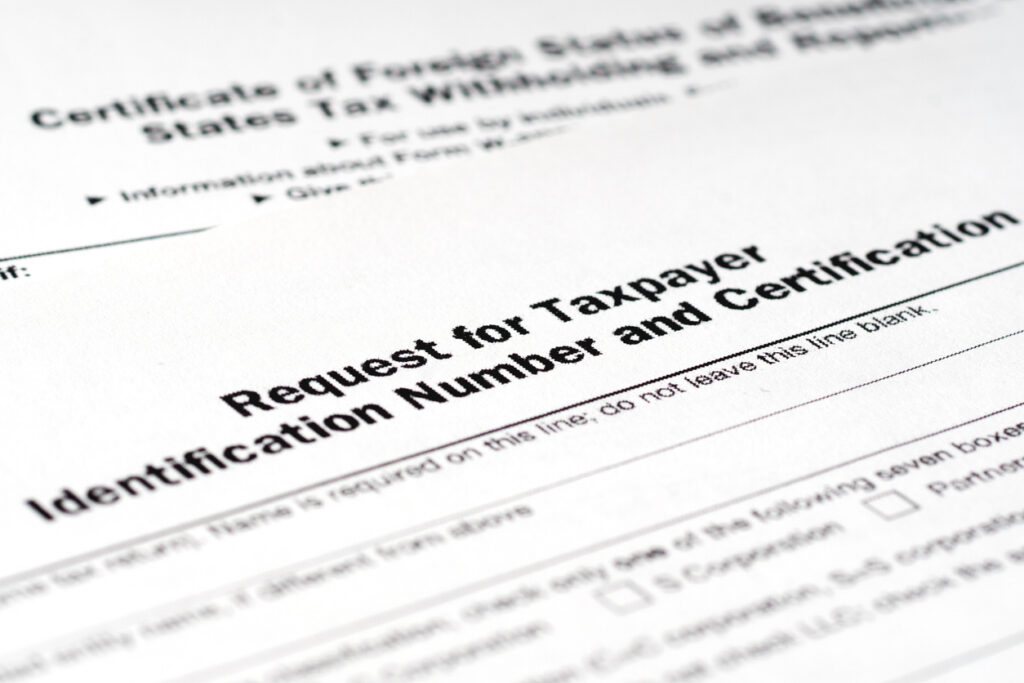If you want to run a business, open a bank account, hire employees, or file taxes in the U.S., you’ll need a Taxpayer Identification Number (TIN). Think of it as your official ID number for anything related to the IRS.
While it might sound like just another piece of paperwork, your TIN is a critical part of getting your business set up the right way. Without it, you could hit roadblocks when it comes to paying taxes, securing funding, or even signing certain contracts.
In this post, we’ll break down what a TIN is, the different types available, who needs one, and how to get yours—without the confusion.
Taxpayer Identification Number Explained
A Taxpayer Identification Number (TIN) is a unique number used by the Internal Revenue Service (IRS) to track tax obligations for individuals and businesses. It’s how the government knows who you are when you file returns, pay taxes, or report income.
There isn’t just one kind of TIN—different types are used for different purposes:
- Social Security Number (SSN) – Used by individuals, including sole proprietors, for personal and business tax purposes.
- Employer Identification Number (EIN) – Used by businesses, LLCs, corporations, and some sole proprietors.
- Individual Taxpayer Identification Number (ITIN) – Used by individuals who can’t get an SSN but still need to file taxes.
No matter which type applies to you, your TIN is an essential piece of your business identity. It’s required for tax filings, often needed for business banking, and can be necessary for licenses and permits.
Types of TINs and Who Uses Them
Not all Taxpayer Identification Numbers are the same. The IRS uses different types of TINs depending on your situation and the type of work you do. Here’s a breakdown:
1. Social Security Number (SSN)
- Who uses it: U.S. citizens, permanent residents, and some temporary residents.
- Common for: Individuals and sole proprietors who don’t have employees and operate under their own name.
- How it works: Issued by the Social Security Administration, this number serves as your personal and, in many cases, your business tax ID.
2. Employer Identification Number (EIN)
- Who uses it: Businesses of all sizes—LLCs, corporations, partnerships, and sole proprietors who hire employees or want separation between personal and business finances.
- Common for: Opening a business bank account, filing certain tax forms, and hiring staff.
- How it works: Issued by the IRS for free through an online application. Think of it as your business’s Social Security Number.
3. Individual Taxpayer Identification Number (ITIN)
- Who uses it: Individuals who need to file taxes in the U.S. but aren’t eligible for an SSN.
- Common for: Nonresident aliens, resident aliens without an SSN, and dependents or spouses of U.S. citizens or residents who don’t qualify for an SSN.
- How it works: Issued by the IRS using Form W-7 and supporting documentation.
Knowing which TIN you need is the first step toward making sure your tax and business filings go smoothly.
How to Get a TIN
The process for getting a Taxpayer Identification Number depends on the type you need. Here’s how each one works:
1. Social Security Number (SSN)
- How to apply: If you’re a U.S. citizen, you probably already have an SSN. If not, you can apply through the Social Security Administration using Form SS-5. You’ll need proof of identity, age, and citizenship or immigration status.
- Timeline: Usually issued within a few weeks of applying.
2. Employer Identification Number (EIN)
- How to apply: Apply online through the IRS website—it’s free and takes just a few minutes. You can also apply by mail or fax using Form SS-4.
- What you’ll need: Your legal name, business name, address, and the type of business structure you’re forming.
- Timeline: If you apply online, you get your EIN immediately.
3. Individual Taxpayer Identification Number (ITIN)
- How to apply: Submit Form W-7 to the IRS, either by mail, in person at an IRS Taxpayer Assistance Center, or through an IRS-authorized Acceptance Agent.
- What you’ll need: Proof of identity and foreign status, such as a passport or national ID card.
- Timeline: Processing typically takes 7–11 weeks, longer during peak tax season.
No matter which TIN you’re applying for, make sure the information you provide matches your official records exactly. Small errors can delay processing and create headaches down the line.
When You Need a TIN
Your Taxpayer Identification Number isn’t just for filing taxes—it’s used in many parts of running a business and handling personal finances. Here are the most common situations where you’ll need one:
1. Filing taxes
Every individual and business in the U.S. needs a TIN to report income and pay taxes to the IRS. Without one, your return can’t be processed.
2. Opening a business bank account
Most banks require a TIN—either an SSN or EIN—before they’ll let you open a business account. It’s part of their identity verification process.
3. Hiring employee
If you plan to hire staff, you’ll need an EIN to report payroll taxes and submit employment forms to the IRS.
4. Applying for licenses or permits
Certain local, state, and federal licenses require a TIN before they can be issued. This includes professional licenses, health permits, and industry-specific certifications.
5. Working with vendors or contractors
Vendors may require your TIN to issue payment or file 1099 forms at the end of the year.
In short: if you’re earning income, paying taxes, or running a business in the U.S., a TIN is more than a formality—it’s a necessity.
Tips for Managing and Protecting Your TIN
Your Taxpayer Identification Number is a key part of your personal or business identity—and it’s a target for fraud if it falls into the wrong hands. Here’s how to manage it safely:
1. Keep it secure
Store physical documents with your TIN in a locked location. If it’s stored digitally, use encrypted files or secure password-protected systems.
2. Share it only when necessary
Only provide your TIN to verified parties, like the IRS, your bank, or licensed vendors. If you’re unsure why someone is requesting it, ask questions before handing it over.
3. Watch for scams
The IRS will never contact you by phone, email, or text to request your TIN. Be wary of unsolicited requests—it’s a common tactic for identity theft.
4. Monitor your accounts
Regularly check your credit reports, tax filings, and business bank accounts for suspicious activity. Catching issues early makes them easier to resolve.
5. Keep your records updated
If your business changes its name, address, or structure, update your TIN records with the IRS right away to prevent processing delays.
Protecting your TIN is just as important as getting one—once compromised, recovering from misuse can be time-consuming and costly.
Your Business’s IRS ID
A Taxpayer Identification Number is more than just a formality—it’s the key that connects you to the IRS and allows you to operate your business legally in the U.S. Whether it’s an SSN, EIN, or ITIN, having the right TIN ensures you can file taxes, open accounts, hire employees, and keep your operations running smoothly.
The application process is straightforward, but the benefits last for the life of your business. Once you have your TIN, protect it like you would any critical piece of business information.
At WorkBay, we help business owners move from paperwork to production. Once your TIN is in place, we can help you find a professional, move-in-ready space so you can get to work faster.
Get Your Space
See available locations, schedule a tour, or talk to our team today.





